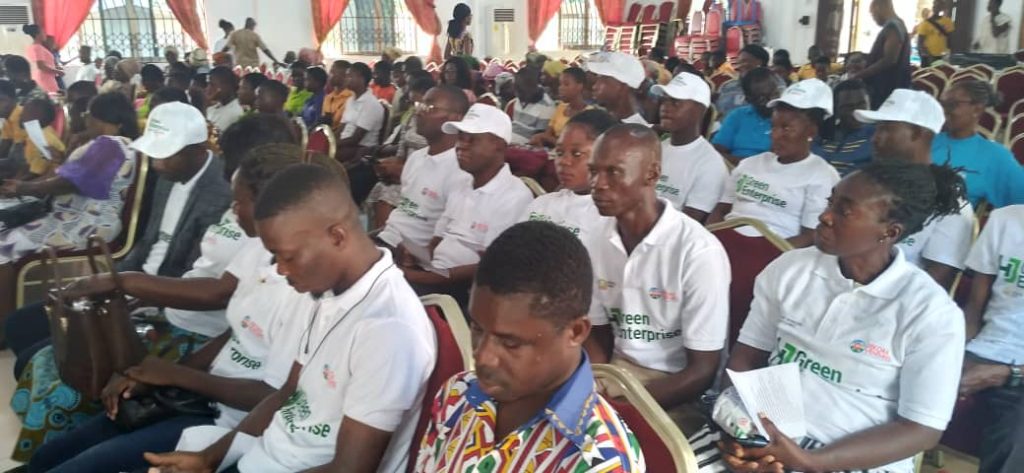By Caleb Kuleke
Ho, Nov. 20, GNA- The Mawuli Estate in Ho in the Volta Region has been declared open defecation free, making it the first community to attain the feat in the country under the Urban Sanitation Programme.
This was disclosed by Mr Divine Bosson, the Ho Municipal Chief Executive (MCE), during this year’s celebration of World Toilet Day celebration dubbed: “Making the Invisible Visible.”
The MCE commended residents of the Estate and other partners, including UNICEF, the Municipal Environmental Health Unit of the Assembly, the Dry Toilet Association of Finland and EDSAM Social Network for their immense contribution towards the achievement.
He said open defecation did not only impact human health and safety but also had a significant impact on human dignity, especially for women and young girls in developing countries, who had to face the shame and loss of privacy of defaecation in public on daily basis.
Mr Bosson urged other communities to emulate the Mawuli Estate example, stressing that the achievement of the Estate would be meaningful unless it was linked to the total Municipality’s attainment of Open Defaecation Free (ODF).
Dr Archibald Yao Letsa, Volta Regional Minister, commended Mawuli Estate for the achievement, saying that he was impressed with the performance and charged them to put measures in place to sustain it.
He assured that work would soon begin on the roads in the Estate community and asked other communities in the Region to institute mechanisms to address their sanitation issues to attain ODF status.
Madam Korama Ocran, Water, Sanitation and Hygiene Officer (WASH) at UNICEF also commended the Estate for achieving the status, saying UNICEF was proud to be associated with the success story of the Mawuli Estate.
She said the ODF status was especially to them as it confirmed that all the interventions, they had supported, including behaviour change, supply chain strengthening, business development and sanitation financing had yielded positive results.

Madam Ocran said UNICEF commenced the urban sanitation project some seven years ago in partnership with the Ho Municipal Assembly with sponsorship from the Kingdom of Netherlands, targeted at improving coverage of sanitation and eliminating open defecation within Ho.
“Our target was 11,000 households, but we have exceeded the target and also achieved ODF status,” she said and that this was possible due to the dedication and commitment of the people.
She said the whole world was off track in achieving Sustainable Development Goals on sanitation, noting that in Ghana only 24 per cent of households had access to basic sanitation while 18 per cent practicing open defecation.
The WASH Officer said the Mawuli Estate had demonstrated that with the determination of the community with little support it was possible and urged other communities to be inspired by this achievement to also work hard towards it
The Ho Mawuli Estate community situated along the Ho-Adidome road has a population estimate of about 1,047 and 310 households in 214 houses with three basic schools, four churches, a guest house and shopping mall.
Mr Jacob Fenteng, Secretary to the Mawuli Estate Sanitation Committee, taking the participants through the journey to the ODF, said the community battled a lot of sanitation issues when it was initially built as all low-cost houses at time were connected to one septic tank.
He said liquid wastes overflowed anytime the septic tank was full thereby polluting the air and due to the increasing population of the community, other human activities, including indiscriminate disposal of solid waste, also became a challenge.
Mr Fenteng said in 2018, EDSAM Social Network in collaboration with the Ho Municipal Assembly came to the community and introduced “SUSU Programme” known as Municipal Saving and Loan Association (MSLA).
The MSLA, he said, was aimed to help members contribute monies which would be later loaned to them to construct their individual septic tanks.
He said the community through the guidance of one Mrs Esinam Cinderella Agbakpe, an environmental health officer at the Ho Municipal Assembly, secured a Basic Sanitation Fund loan from the Assembly to fast track the construction of the tanks.
Mr Fenteng said the community also formed a sanitation committee which prepared a community open defecation map and sanitation by-laws and action plan, which prevented members from engaging in open defecation.
He said currently every house in the Estate has its own toilet and waste management facility and people who were rearing animals also ensured that they were kept in their appropriate places like hen coups, pens and dog cages, resulting in the current status of the community.
The Regional Inter-Agency Coordinating Committee on Sanitation of the Volta Regional Coordinating Council presented a citation to the community for the success.
GNA